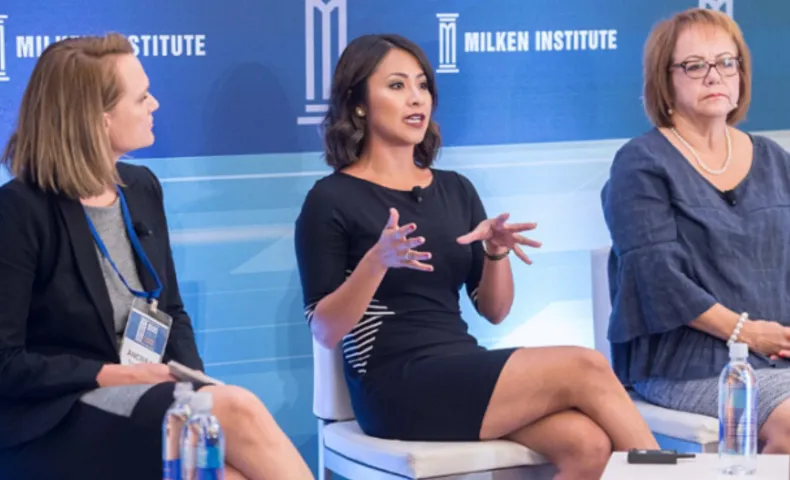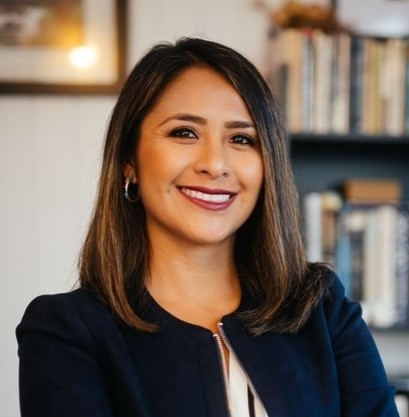 Photo Courtesy of Immigrants Rising
Photo Courtesy of Immigrants Rising
“Hear Our Stories”
 Iliana G. Perez, Ph.D., immigrated to the U.S. with her family from Mexico when she was eight. After growing up in California’s Central Valley, she earned a bachelor’s degree in mathematics and a master’s degree in economics from Fresno State, as well as a Ph.D. in education policy from Claremont Graduate University. In 2023, she was named executive director of Haas, Jr. Fund grant partner Immigrants Rising, which has grown to become a leader in changing policies and systems to support undocumented people to thrive. Iliana joined Immigrants Rising after more than a decade of groundbreaking work leading research and initiatives to empower and support undocumented entrepreneurs in the United States.
Iliana G. Perez, Ph.D., immigrated to the U.S. with her family from Mexico when she was eight. After growing up in California’s Central Valley, she earned a bachelor’s degree in mathematics and a master’s degree in economics from Fresno State, as well as a Ph.D. in education policy from Claremont Graduate University. In 2023, she was named executive director of Haas, Jr. Fund grant partner Immigrants Rising, which has grown to become a leader in changing policies and systems to support undocumented people to thrive. Iliana joined Immigrants Rising after more than a decade of groundbreaking work leading research and initiatives to empower and support undocumented entrepreneurs in the United States.
Elica: What’s your journey to working in the immigrant rights movement?
Iliana: When I graduated from college, it was hard to figure out my path forward as an undocumented person in this country. I connected with Kathy Gin (former Immigrants Rising executive director and co-founder), and she helped me start a project to understand post-college opportunities for undocumented students. After interviewing graduates, I began to explore entrepreneurship as a powerful alternative path to employment, because your immigration status doesn’t matter if you become an entrepreneur. Ultimately, that led me to graduate school and a part-time engagement with Immigrants Rising, where I developed a program to provide startup capital to undocumented entrepreneurs.
Elica: How did your early work with Immigrants Rising prepare you for your current leadership role?
Iliana: I was working as a researcher on Latino entrepreneurship at Stanford University when the opportunity came up to work full-time at Immigrants Rising. I always loved being a researcher, but my heart was with the immigrant community and developing programs to support undocumented people. So, Kathy brought me on board to grow the program we had started, and it grew into a wonderful partnership with the state of California to provide immigrant entrepreneurs with millions of dollars in support and training—and a majority of those funds go to undocumented individuals. Kathy really mentored me in program development and fundraising and public-private partnerships. Scaling that program gave me the confidence to apply for the executive director position.
Elica: As you step into this new role, what is your vision for the immigrant rights movement and for Immigrants Rising?
Iliana: Immigrants Rising is an exemplary organization where our work is guided and led by the undocumented community. My experience of growing our entrepreneurship initiative helped me see the potential to scale all of our work at the state and national levels. We want to bring our community’s lived experience to the work of designing programs that truly support undocumented individuals to live better lives.
It’s disheartening that we haven’t seen real progress on immigration issues at the federal level, but I see a lot of great opportunities right now in California and other states in areas like expanding access to higher education and mental health programming and other critical supports for undocumented people.
My vision is to do everything in my power to lift up the voices and the stories of our communities so people see our humanity and everything we can contribute, and so they understand what it will take for us to reach our potential.
Elica: How can funders support you to achieve that vision?
Iliana: Immigrants Rising is fortunate to have funding partners who have met us where we are and who have trusted us and given us the flexibility to experiment and grow as an organization. When we needed training in budgeting and fundraising, foundation partners supported us to bring in consultants who could help.
Funders support us to do our best work when they meet us as human beings and when they make an effort to hear our stories and our vision for our organizations and communities. One area where I think groups like ours need more support right now is in making connections with other groups, with state government, and with other funders. Funders are in a strong position to make introductions and facilitate those connections.
